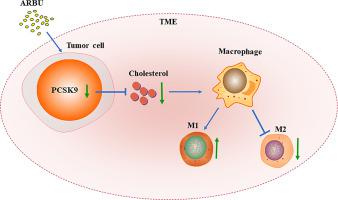当前位置:
X-MOL 学术
›
Phytomedicine
›
论文详情
Our official English website, www.x-mol.net, welcomes your
feedback! (Note: you will need to create a separate account there.)
Arenobufagin modulation of PCSK9-mediated cholesterol metabolism induces tumor-associated macrophages polarisation to inhibit hepatocellular carcinoma progression
Phytomedicine ( IF 6.7 ) Pub Date : 2024-03-13 , DOI: 10.1016/j.phymed.2024.155532 Yueyue Li 1 , Yang Chen 2 , Cheng Zhao 3 , Yuting Yang 1 , Mei Zhang 2 , Hui Cheng 1 , Qinglin Li 1 , Meng Wang 1
Phytomedicine ( IF 6.7 ) Pub Date : 2024-03-13 , DOI: 10.1016/j.phymed.2024.155532 Yueyue Li 1 , Yang Chen 2 , Cheng Zhao 3 , Yuting Yang 1 , Mei Zhang 2 , Hui Cheng 1 , Qinglin Li 1 , Meng Wang 1
Affiliation

|
The tumor microenvironment (TME) of hepatocellular carcinoma is heterogeneous enough to be prone to drug resistance and multidrug resistance during treatment, and reprogramming of cholesterol metabolism in TME mediates tumor-associated macrophages (TAMs) polarization, which has an impact on the regulation of malignant tumor progression. Arenobufagin (ARBU) was extracted and isolated from toad venom (purity ≥98 %), which is the main active ingredient of the traditional Chinese medicine Chan'su with good anti-tumor effects. To investigate the regulatory effect of ARBU on lipid metabolism in tumor microenvironment, interfere with macrophage polarization, and determine its mechanism of action on liver cancer progression. In this study, the inhibitory effect of ARBU on the proliferation of Hepa1–6 in C57 mice and the safety of administration were evaluated by establishing a transplanted tumor model of Hepa1–6 hepatocellular carcinoma mice and using 5-FU as a positive control drug. In addition, we constructed a co-culture system of Hepa1–6 cells and primary mouse macrophages to study the effects of ARBU on the polarization phenotypic transformation of macrophages and the proliferation and migration of hepatoma cells. The influence of ARBU on the metabolism of lipids in the hepatocellular carcinoma mouse model was investigated by combining it with lipidomics technology. The influence of ARBU on the PCSK9/LDL-R signaling pathway and macrophage polarization, which regulate cholesterol metabolism, was tested by using qRT-PCR, gene editing, IF, and WB. ARBU significantly inhibited the proliferation of Hepa1–6 and , regulated cholesterol metabolism, and promoted the M1-type polarization of macrophages in the tumor microenvironment. ARBU inhibits cholesterol synthesis in the TME through the PCSK9/LDL-R signaling pathway, thereby blocking macrophage M2 polarization, promoting apoptosis of the tumor cells, and inhibiting their proliferation and migration.
中文翻译:

Arenobufagin 对 PCSK9 介导的胆固醇代谢的调节诱导肿瘤相关巨噬细胞极化,从而抑制肝细胞癌进展
肝细胞癌的肿瘤微环境(TME)具有足够的异质性,在治疗过程中容易产生耐药性和多药耐药性,TME中胆固醇代谢的重编程介导肿瘤相关巨噬细胞(TAM)极化,从而影响恶性细胞的调节。肿瘤进展。蟾蜍精(ARBU)是从蟾蜍毒液中提取分离得到的(纯度≥98%),是中药蟾蜍的主要活性成分,具有良好的抗肿瘤作用。探讨ARBU对肿瘤微环境脂质代谢的调节作用,干扰巨噬细胞极化,并确定其对肝癌进展的作用机制。本研究通过建立Hepa1-6肝细胞癌小鼠移植瘤模型,以5-FU作为阳性对照药,评价ARBU对C57小鼠Hepa1-6增殖的抑制作用及给药安全性。此外,我们构建了Hepa1-6细胞与原代小鼠巨噬细胞的共培养体系,研究ARBU对巨噬细胞极化表型转化以及肝癌细胞增殖和迁移的影响。结合脂质组学技术研究ARBU对肝癌小鼠模型脂质代谢的影响。通过 qRT-PCR、基因编辑、IF 和 WB 测试了 ARBU 对调节胆固醇代谢的 PCSK9/LDL-R 信号通路和巨噬细胞极化的影响。 ARBU 显着抑制 Hepa1-6 和 的增殖,调节胆固醇代谢,促进肿瘤微环境中巨噬细胞的 M1 型极化。 ARBU通过PCSK9/LDL-R信号通路抑制TME中胆固醇的合成,从而阻断巨噬细胞M2极化,促进肿瘤细胞凋亡,抑制其增殖和迁移。
更新日期:2024-03-13
中文翻译:

Arenobufagin 对 PCSK9 介导的胆固醇代谢的调节诱导肿瘤相关巨噬细胞极化,从而抑制肝细胞癌进展
肝细胞癌的肿瘤微环境(TME)具有足够的异质性,在治疗过程中容易产生耐药性和多药耐药性,TME中胆固醇代谢的重编程介导肿瘤相关巨噬细胞(TAM)极化,从而影响恶性细胞的调节。肿瘤进展。蟾蜍精(ARBU)是从蟾蜍毒液中提取分离得到的(纯度≥98%),是中药蟾蜍的主要活性成分,具有良好的抗肿瘤作用。探讨ARBU对肿瘤微环境脂质代谢的调节作用,干扰巨噬细胞极化,并确定其对肝癌进展的作用机制。本研究通过建立Hepa1-6肝细胞癌小鼠移植瘤模型,以5-FU作为阳性对照药,评价ARBU对C57小鼠Hepa1-6增殖的抑制作用及给药安全性。此外,我们构建了Hepa1-6细胞与原代小鼠巨噬细胞的共培养体系,研究ARBU对巨噬细胞极化表型转化以及肝癌细胞增殖和迁移的影响。结合脂质组学技术研究ARBU对肝癌小鼠模型脂质代谢的影响。通过 qRT-PCR、基因编辑、IF 和 WB 测试了 ARBU 对调节胆固醇代谢的 PCSK9/LDL-R 信号通路和巨噬细胞极化的影响。 ARBU 显着抑制 Hepa1-6 和 的增殖,调节胆固醇代谢,促进肿瘤微环境中巨噬细胞的 M1 型极化。 ARBU通过PCSK9/LDL-R信号通路抑制TME中胆固醇的合成,从而阻断巨噬细胞M2极化,促进肿瘤细胞凋亡,抑制其增殖和迁移。






























 京公网安备 11010802027423号
京公网安备 11010802027423号